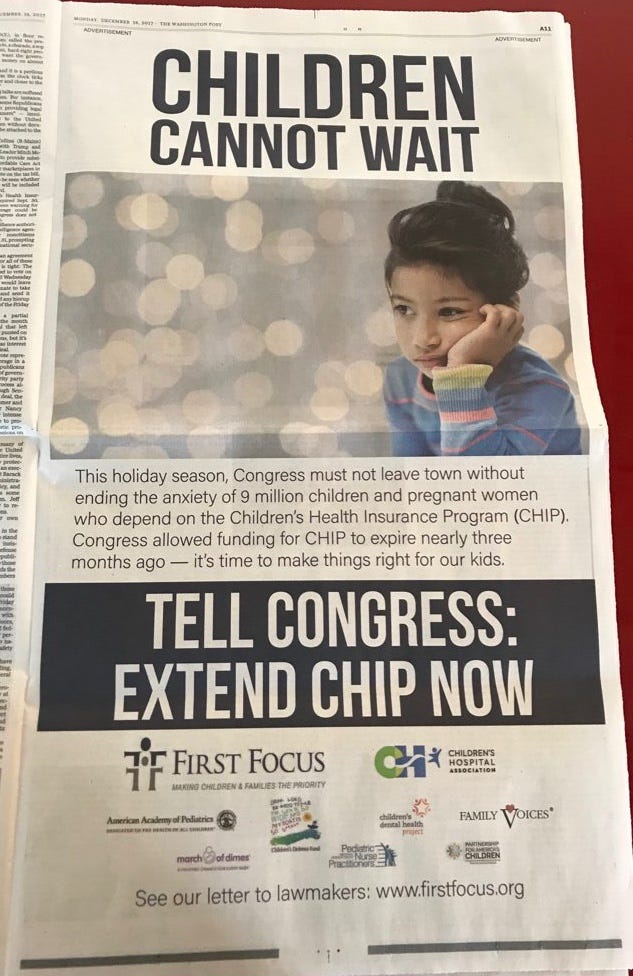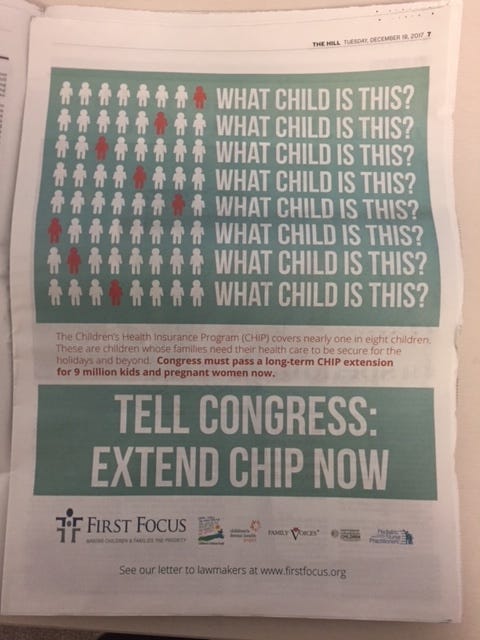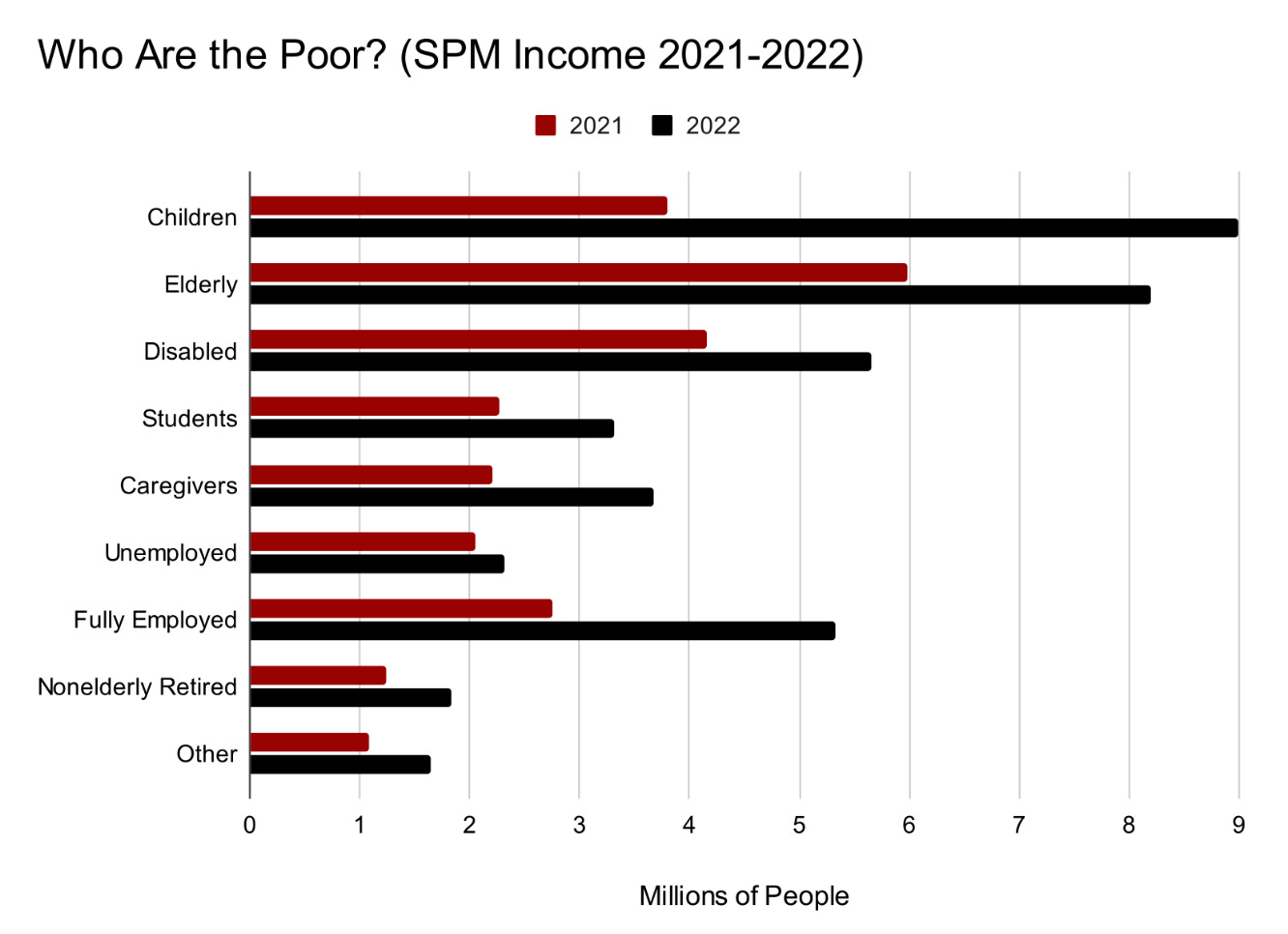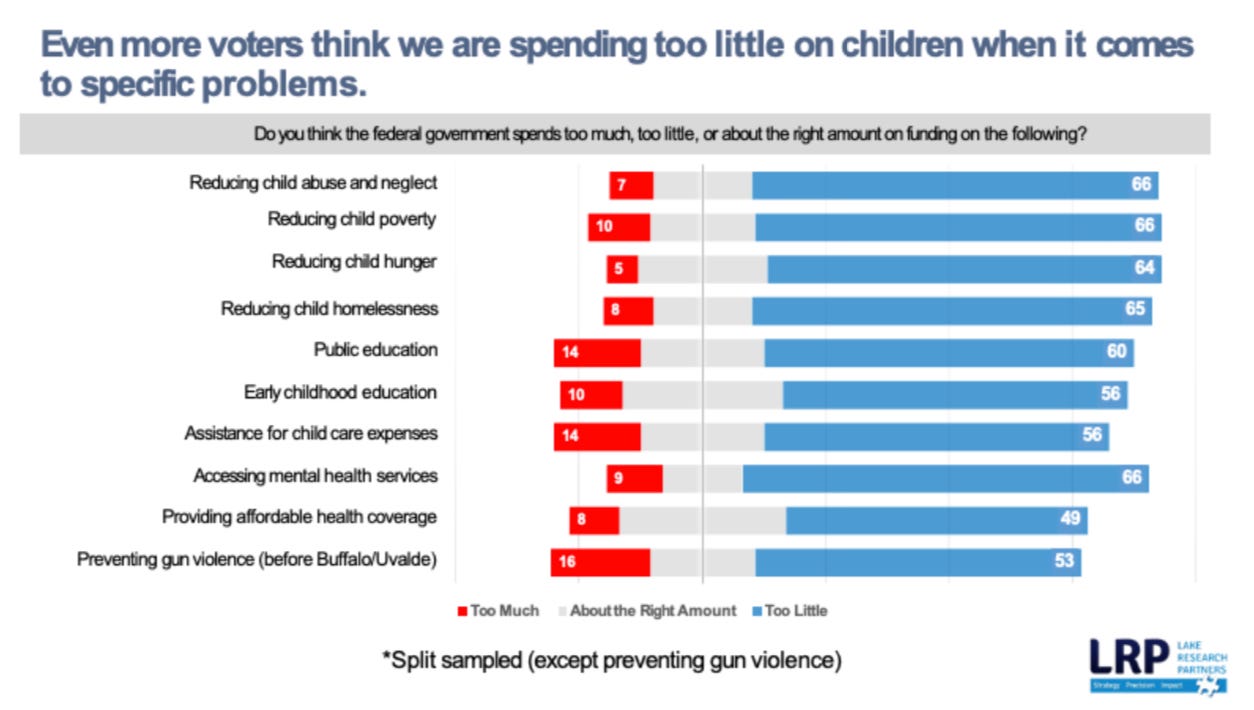A few years ago, a good friend’s son played in the SMU-Navy football game, and I was psyched to see him play. But if you have never been to a game at Navy’s football stadium, there is a dizzying array of advertisements on the scoreboard, the field, the walls of the stadium, and public announcements throughout the game – pretty much all defense contractors. There was not an inch of unused advertising space taken up by them. It felt like third down, replays, halftime, and official reviews were brought to you by either Lockheed Martin, Boeing, Northrup Grumman, or Raytheon.
They know where their “bread is buttered” and every defense company was there competing for attention and as a demonstration of their support for the Navy.
But while at the game, I wondered why there was not the same relationship and visible support by other companies for the well-being of children and families, who are instrumental in the success of many businesses.
Furthermore, companies can be very influential in the halls of Congress and state capitols, and it cannot escape them that investments in policies that support children and families are good for our collective future but also a smart, strategic business move. A healthier, more educated, and thriving young generation translates into a target audience that contributes to a more robust and sustainable business environment as both short- and long-term customers.
While Lockheed Martin, Boeing, Northrup Grumman, and Raytheon can be counted on to spend millions of dollars in lobbying expenses to demand investments in our nation’s defense industry, children and families desperately need something similar. Although a number of child advocacy groups have started up and declared they will be the “next AARP for children,” their life cycles have often been unsustainable and short.
There is no doubt that some businesses do step up to provide visible charitable support for local schools, youth sports teams, children’s hospitals, and other charitable causes. However, what I am talking about here is the need for companies like Mattel, Hasbro, LEGO, Gap, Scholastic, Target, Disney, Nickelodeon, DreamWorks, Sony, Microsoft, Nintendo, Gerber, Heinz, General Mills, Nike, Adidas, and Under Armour to provide sustainable support for the enactment of public policies that would improve the lives of children and families, such as support for public school funding, health care coverage, child care, and improved financial support for the Child Tax Credit.
This is in sharp contrast to the astroturf financing of culture wars that fuel ideological attacks on public schools, teachers, librarians, and the LGBTQ community, and in support of extremist theology and the whitewashing of history and science in schools. These Koch and other billionaires financed campaigns in groups like Moms for Liberty with the primary purpose of whipping up distrust, division, and hate for ideological gain through the politics of fear.
Consequently, what is desperately needed is a sustained movement that focuses on the best interests and needs of children. Some of this is happening at the grassroots level, as parents and teachers stood up in recent school board elections to successfully push back in favor of children and public education and against the Moms for Liberty politics of fear and division.
But what is needed is for business groups to step up and help change the narrative. While companies lobby for things of specific interest to their industries or businesses, they have to know that it benefits them if the Child Tax Credit successfully lifts millions of children out of poverty and provides additional funding to 61 million children across this country and that an educated and healthy next generation benefits the nation.
In what can be an important first step and an enormous win-win, I urge them to be more visible and supportive of child advocates, who are pushing for a deal in Congress that would extend both business tax credits and the Child Tax Credit. Some pro-family conservatives are already making the case.
The Current Landscape of Child-Focused Policies
Educational Policies and Their Impact
In the realm of public education, which is pivotal for the development of future talent and societal progress, the challenges facing students are multifaceted. Schools across the United States often grapple with underfunding, resulting in overcrowded classrooms, outdated resources, and insufficient support for special needs education.
Cultural wars, bathroom wars, book bans, and even attempts to censor spelling lists are distracting communities, educators, parents, and students and taking up time, effort, and money that should instead be focused on the education of our nation’s students, including the development of skills such as critical thinking, creativity, and technology literacy.
As an example, Gov. Ron DeSantis’s attacks on public schools, his book bans, “Don’t Say Gay” law, micromanagement of teachers, rejection of AP African American studies, and underfunding of education have created massive teacher shortages in K-12 education and higher education. Students are suffering.
This is bad for our children, bad for our nation, and bad for business.
Businesses should band together and demand an end to these divisive cultural wars and a return to what is in the best interest of our nation’s children – their education and well-being. For all the positive benefits of programs like Communities in Schools, that can all be destroyed by divisive agendas pushed at the national, state, or local levels.
Healthcare and Nutrition Policies: A Cornerstone of Child Development
Child healthcare is another critical area where policy decisions have far-reaching consequences. Access to quality healthcare during the early years is instrumental in ensuring healthy physical and cognitive development. Yet, many children face barriers to accessing essential health services, including preventive care, mental health support, immunizations, and nutritional support, all of which are fundamental for holistic development.
At a time when infant and child mortality are rising in this nation (with infant mortality rising for the first time in two decades), states have disenrolled more than 2 million children from Medicaid. As a nation, we should ensure all children have health insurance and not be cutting children off from health coverage.
This is bad for our children, bad for our nation, and bad for business.
Furthermore, while millions of private sector dollars are flowing to support the spread of anti-vaccine misinformation and the encouragement of unhealthy lifestyles, why aren’t companies and businesses that offer healthy and life-saving products investing in supporting child health advocacy and groups who share their desire for health and food security?
Financial Support Systems: The Role of Policies like the Child Tax Credit
The Child Tax Credit, a policy designed to provide financial relief to families with children, demonstrated its efficacy in reducing child poverty and supporting family stability in 2021. Child poverty rates were dramatically cut, child hunger was reduced, and the families of over 60 million were better off as a result of the Child Tax Credit. Moreover, the evidence tells us that consistent financial support for families not only alleviates immediate economic strain but also contributes to better long-term outcomes for children in terms of education, health, and overall well-being.
Unfortunately, despite its proven benefits, the expanded Child Tax Credit was allowed to expire at the close of 2021 and child poverty increased from a low of 5.2% in 2021 to 12.4% in 2022, according to the U.S. Census Bureau. Families saw their taxes rise in 2022 by more than $100 billion. For businesses that serve children and families, they do worse when families are worse off.
Again, this is bad for our children, bad for our nation, and bad for business.
The Benefits of Investing in Children
A Foundation for Societal Progress
Investing in children is not merely a moral imperative; it's a strategic investment in the future of society. When children grow up in environments that support their health, education, and overall well-being, the benefits are widespread and long-lasting. There is an enormous return on investments when it comes to children, and business leaders could be beneficial in making this case to lawmakers.
Educational Success and Economic Growth: Education is a powerful driver of economic development. Children who receive quality education are more likely to become innovative, productive adults who contribute positively to the economy. Studies consistently show that investments in early education yield high returns in terms of increased earnings and social contributions in adulthood.
Healthier Communities: Access to quality healthcare in childhood sets the stage for healthier life trajectories. This means reduced healthcare costs in the long term and a more robust, capable workforce. Additionally, healthier children are more likely to perform better academically and have higher attendance rates in school.
Social Stability and Reduced Inequality: Supporting children, especially those from underprivileged backgrounds, helps mitigate the cycle of poverty. Policies like the Child Tax Credit have shown remarkable efficacy in reducing child poverty, which is linked to lower crime rates, reduced welfare dependency, and greater social cohesion. According to an estimate by the National Academy of Sciences, Engineering, and Medicine, child poverty is costing our nation up to $1.1 trillion annually.
Direct Business Benefits
For businesses, particularly those catering to children and families, the direct benefits of advocating for and investing in child-focused policies are substantial.
Building a Skilled Workforce: By supporting education and health policies, businesses help cultivate a future workforce with the skills and health necessary to succeed in an increasingly competitive and technology-driven world. This is particularly relevant for sectors dependent on highly skilled labor.
Brand Loyalty and Consumer Trust: Companies that are visibly committed to the well-being of children can build strong brand loyalty among consumers. Parents and families are more likely to trust and stay loyal to brands that demonstrate a genuine concern for children's issues.
Innovation and Market Expansion: A well-educated, healthy population of children and young adults represents not just a workforce, but also a market. These individuals are future consumers who will drive demand for new, innovative products and services.
The impact of investing in children extends beyond immediate beneficiaries. It creates a compounding effect, enhancing the quality of life for entire communities and fostering conditions conducive to business growth and innovation. When children thrive, societies thrive – and businesses operating in these societies are positioned to reap the rewards.
Conclusion
There is no doubt there is a little “be careful what you wish for” when it comes to corporate engagement in child advocacy. For example, the actions of Patriot Mobile in support of the insertion of a cultural warfare agenda in North Texas school board races have been terrible for students and schools. The influx of money to Children’s Health Defense to push an anti-vaccine agenda is detrimental to children and our health system.
However, these things are already happening and are not likely to go away. But these are agendas that are not supported by most people or even businesses, but where are the investments in advocacy in support of education, child health, and cutting child poverty?
What I am suggesting here is that children need additional investments in improving public policy that builds upon the work of foundations like the David and Lucile Packard Foundation, the Annie E. Casey Foundation, the Robert Wood Johnson Foundation, the Pritzker Foundation, GHR Foundation, and the Oak Foundation. Kids are in crisis and desperately need greater support from additional foundations for this work.
Moreover, when it comes to political action, kids don’t vote, don’t join membership groups like AARP, don’t have major Political Action Committees (PACs), and don’t have paid lobbyists akin to what corporations do. Therefore, kids need more support for direct child advocacy itself, just as former Hasbro CEO Alan G. Hassenfeld did in 2017 in support of an extension of the Children’s Health Insurance Program (CHIP) after Congress and the Trump Administration had allowed it to expire for several months. The support that Hasbro offered to the campaign to #SaveCHIP by child advocates was of enormous benefit.
As the former chairman and CEO of Hasbro Toys, the family-run business my grandfather founded in 1923, I have spent my career bettering the lives of children. I have always loved — and lived by — the words of Danny Kaye: “The greatest natural resource that any country can have is its children.”
But right now, we are not treating children as our greatest natural resource. The Children’s Health Insurance Program (CHIP), one of the most remarkable success stories we have, has been left dangling for nearly three months since it expired on Sept. 30. CHIP provides critical health care to nearly 9 million low-income children and peace of mind to their parents. It is, very simply, a no-brainer. Children who receive high quality and necessary health care grow up to be stronger, smarter and more productive adults.
Hassenfeld added:
I am no politician, but I know a success story when I see one, and CHIP is an American success story. For 20 years, it has worked for children and families across the country. Congress has spent enormous time working on a massive tax bill, instead of health care for children.
Thank you for my tax rate going from 39.6 to 37 percent, but I would give it up to take care of our greatest national resource and future — our children.
The holidays are, above all else, about children. I cannot remain silent without doing everything in my power to sound the alarm and tell Congress it must fund CHIP now. I call on friends, colleagues, associates and all who care about our children to raise their voices on this issue.
Thanks, in part to Mr. Hassenfeld’s advocacy and support, Congress finally passed an extension of CHIP back in January 2018.


Source: Ads in Washington Post and The Hill, Dec. 2007
Our nation’s children need more of that. Right now, Congress, which has been paralyzed by inaction, division, and infighting, could do something worthwhile for the American people and children. For one, Congress is considering its FY 2024 budget and should be making investments in children rather than targeting them for severe cuts.
Second, Congress has allowed both the R&D tax credit and the Child Tax Credit to expire and could pare them for a “win-win.” Although neither is likely to get passed as a free-standing bill, their combination is something that business should step up to support…NOW.
Third, business groups could emulate efforts like the #1 Question Campaign in Kansas City, which was a collaboration of “business, civic, religious, education, and philanthropic communities” that “developed a campaign to mobilize community support for children and youth.” By asking community members to commit to the well-being of children by applying one simple, elegant question – “Is It Good for the Children?” – in “everything they did within their homes, neighborhoods, schools, businesses, places of worship, and in issues of public and corporate policy,” major and tangible progress was made for children in Kansas City. An evaluation of its positive effects by the Robert Wood Johnson Foundation in 2004 found significant and tangible gains in funding, support, expansion of family-friendly workplaces, and an increased focus on the needs of children across an array of community and policy issues.
Let’s strive for better for our kids – rather than division, discord, and distrust.
In the end, our legacy as a society will not be defined by our political divides, but by the strength and depth of our commitment to nurturing the dreams, God-given talent, and well-being of our children.
A better future for our children is in all of our interests.
*****
If you are concerned about helping to ensure that children and their needs, concerns, and best interests are no longer ignored by policymakers, please join First Focus on Children as an “Ambassador for Children”. First Focus on Children is also short of our fundraising goal for the year, so we would be grateful if you considered becoming a paid subscriber to help us continue our work on behalf of children.







